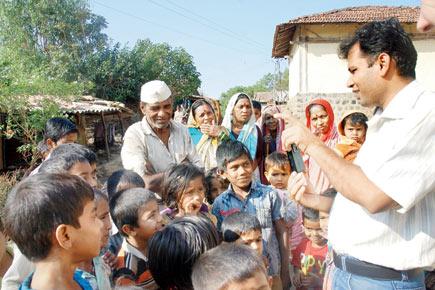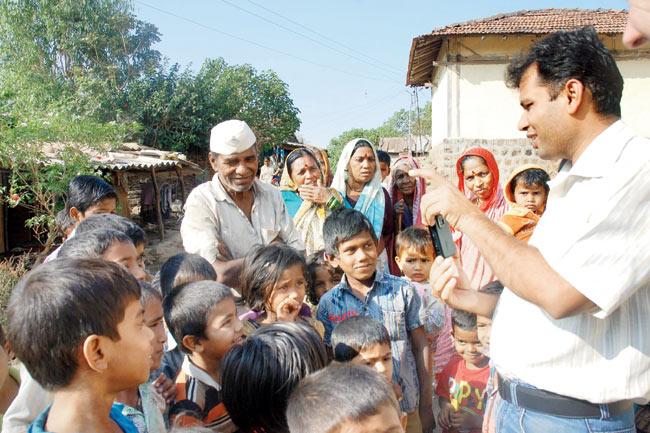Nashik-based linguistic enabler Sunil Khandbahale has created 22 Indian regional language digital dictionaries and developed the first-ever dictionary on SMS. The INK Fellow, recently back from a trip to the US, tells Moeena Halim about how his necessity became the mother of invention

“Over a billion people in our country don’t understand English. The dominance of the language on the Internet, signage and a majority of published texts is the main hurdle in education, career and communication for native language speakers. This has caused a ‘digital-divide’ in this era of globalisation. The whole world is coming closer and yet we are separated by languages,” says Sunil Khandbahale, who’s made language literacy his life’s mission.
ADVERTISEMENT
 Sunil Khandbahale educating children in a rural area with mobile phones
Sunil Khandbahale educating children in a rural area with mobile phones
Born to a family of farmers in Mahiravani village in Nashik district, Khandbahale was schooled in his native Marathi. He was first hit by the language barrier 14 years ago at the English-medium Government Polytechnic at Ahmednagar. He had been tempted to quit the engineering course when he came across a dictionary, which became his lifeline and eventually enabled him to rank among the top four in class.
But his own success wasn’t enough. “I thought about all of my class-mates who had run away. The dictionary had worked for me so I thought, ‘Why not for others?’,” recalls Khandbahale. He began by distributing Xerox copies of his own compiled dictionaries until he thought of a digital dictionary and set about teaching himself programming. “I created an online dictionary only to realise that barely 10 per cent people have access to the Internet. So I started building mobile apps for Java, Symbian, Windows, Andoid. But over 80 per cent of the phones did not have the capability to install or run the apps,” he rues. The common denominator, he found, was SMS and so he set up a service called ‘Dictionary on SMS’ — the world’s first short messaging service in 22 Indian languages.
“Our first phase was to compile Indian official languages. In the second phase, we are going to cover vernacular languages and dialects. Third, we will be adding international languages and in the fourth phase, we will integrate all these languages together to form a seamless real-time translation platform for the entire world,” he adds.
Awarded the INK fellowship in 2013, Khandbahale spent last month touring the USA with the programme, travelling across the “hotspots of American innovation.” He is running innovation workshops with MIT and Harvard for students in Nashik to create social entrepreneurs. “There are 18 to 20 colleges here. Thousands of graduates leave the city for jobs. We want them to stay in Nashik and guide them to solve local issues. For example, Nashik will be hosting Sinhasth Kumbhmela in 2015 where over 30 million pilgrims will visit the city. So our goal is to provide services for millions by creating a new generation of social entrepreneurs dedicated to solve problems like health and sanitation, among others,” he explains.
 Subscribe today by clicking the link and stay updated with the latest news!" Click here!
Subscribe today by clicking the link and stay updated with the latest news!" Click here!







